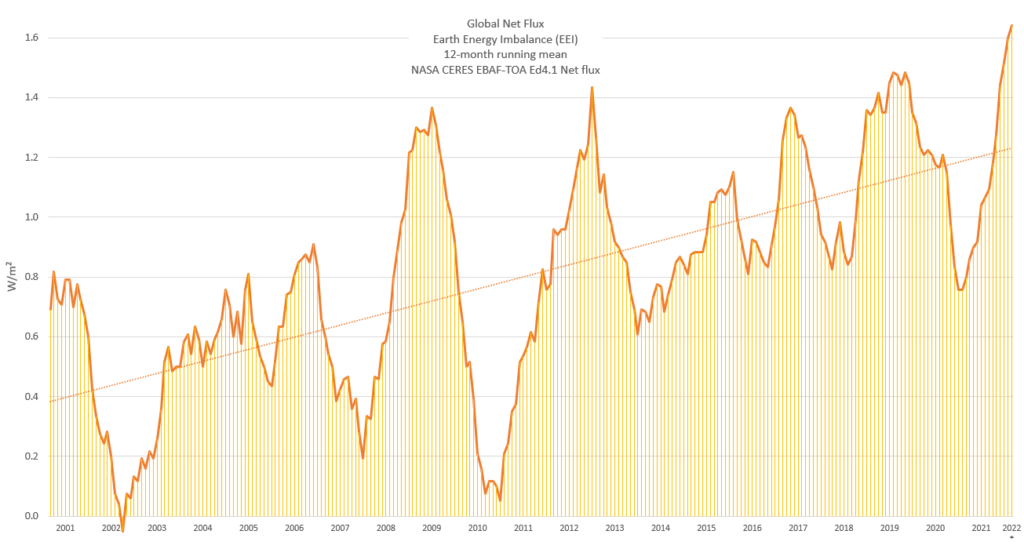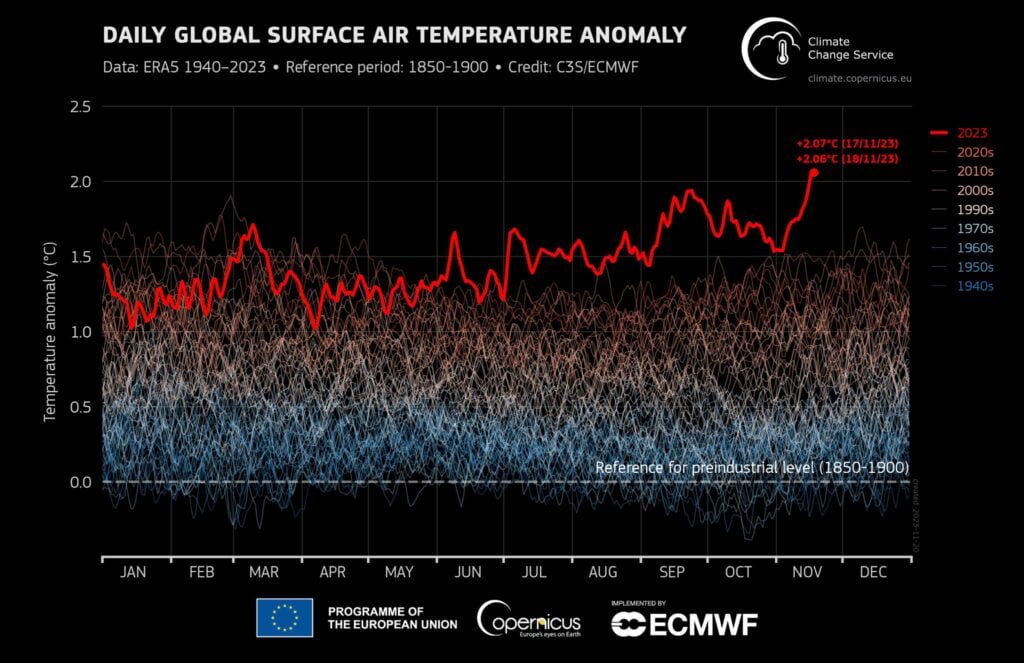I have merged several posts from the old hosting here.
Scorching heat (July 2023)
Monday, July 3, 2023 was the warmest day ever recorded globally, according to data from the U.S. National Center for Environmental Prediction
On that day, the global average temperature reached 17.01C (62.62F), surpassing the August 2016 record of 16.92C (62.46F), as heat waves scorched across the world.
Tuesday, 4 July 2023, broke this record, with the global average temperature reaching 17.18 degrees Celsius.
This record will probably be broken in the coming days, as all signs indicate a summer of fire. I’m afraid this is the new normal. That we’ll get to rejoice when we have days when the air is more breathable
We have a surplus of energy
A joint study by NASA and NOAA finds that Earth’s energy imbalance has doubled. The difference between the amount of solar energy the Earth absorbs and the amount of energy the Earth loses (through the emission of infrared thermal radiation) has reached 1.64 W/m².
Where does the excess energy go? Most of it (about 90%) warms the oceans, and the rest warms the land, melts snow and ice, and warms the atmosphere.

Photo from https://twitter.com/LeonSimons8/status/1522342203481370625
We are a destructive species
Earth Overshoot Day is the date on which humanity’s consumption of natural resources exceeds the Earth’s capacity to regenerate them in that year. This date is calculated by the Global Footprint Network, an international research organization that tracks mankind’s use of natural resources.
This year, Earth Overshoot Day is on 2 August. Last year it was on 28 July. Unfortunately, the real progress amounts to less than one day, with the remaining four days being “earned” through the use of improved datasets.
The conclusion is as simple as it is bleak: the planet is hopelessly fucked. All these temperature records and the Earth’s growing energy imbalance show that we are rapidly heading toward a point of no return. And unfortunately, I don’t see much of a solution to that.
Summer… in October
Yesterday was one of the warmest October days I can ever remember. At one point, around 4.05 pm, my garden thermometer read 30.5°C.
I looked out of curiosity at the weather data in my collection and only in 1952 was it warmer than this in October. I discovered that the absolute record for the month of October dates back to 1952, with a temperature of 35.5°C being reached on 2 October of that year at the Bucharest-Filaret and Bucharest-Afumați weather stations[source].
However, the temperature peak of 1952 was reached at the beginning of the month, not near its end. October 21 this year is the warmest since measurements have been taken. No less than 129 weather stations broke the temperature record for the day. We find values of 35.1°C in Măgurele, 32.9°C in Bacău, 31.8°C in Constanța.
Oravita recorded a minimum temperature of 23.7°C, setting a new national record.
Our neighbors across the Prut, in the Republic of Moldova, also have summer in October. The temperature at the University of Chisinau was 34.3°C, which broke the previous record of 33.6°C set in 1952.
I honestly don’t know what to say about this heat. I’d like to think that 2023 is just an exceptionally hot year and the hot weather is due to El Nino. But sadly, data shows a worrying picture where this autumn is just the beginning, and it is unclear how climate change will evolve in the near future.
Among other things, I follow a Twitter account called Extreme Temperatures Around The World and see that all over the world things have gone crazy. In the southern hemisphere, where the seasons are reversed from ours, spring is still in the air by the end of November. Every day, new record temperatures are being reached, some over 40 degrees.
17 November 2023 – a day that broke all records

ERA5 data indicates that 17 November was the first day on which global temperature exceeded 2°C above pre-industrial levels, reaching 2.07°C above the 1850-1900 average. The provisional ERA5 value for 18 November is 2.06°C.
X / CopernicusECMWF
What will happen from now on? We are likely to see more and more days with overruns of this threshold. And the longer we stay above this threshold, the more irreversible climate change will become. We will have increasingly intense and persistent heat waves. Crops will be seriously affected, which will increase food prices.
I don’t want to turn into a doomsday prophet, but the future doesn’t look great.
Article image by Matt Palmer on Unsplash